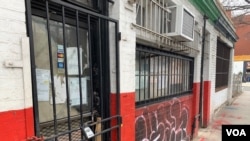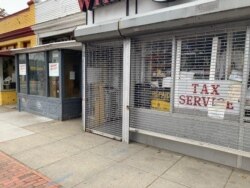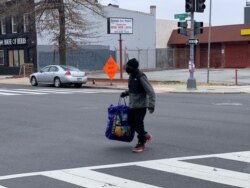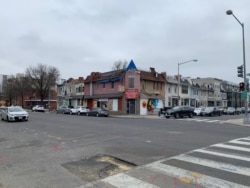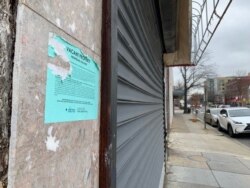Small storefronts sit empty along a block of one of Washington's historic African American neighborhoods. For decades, Black businesses thrived here, catering to loyal customers. Today, during the coronavirus pandemic, those who once patronized the establishments doubt they'll ever reopen.
"I can't count the number that closed and were never replaced," Sam Higgins, an African American resident of the capital city's Park View neighborhood, told VOA. "We used to patronize these places. I've seen Black-owned barber shops, convenience stores and restaurants close. They've been struggling before the pandemic and the bad economy forced them out of business."
The padlocked businesses along this stretch of Georgia Avenue, a major Washington thoroughfare, illustrate the demise of small Black-owned businesses across America. Those that remain open are simply trying to stay afloat.
"The state of Black business in America is dismal," said Rick Wade, a senior vice president at the U.S. Chamber of Commerce. "Our data shows some 2.6 million Black businesses across America, most of them sole proprietors, have already closed as a result of the pandemic."
A recent survey by the chamber and MetLife, an insurance company, found 66% of all minority businesses forced to shut down last year may never reopen – despite trillions of dollars of federal stimulus pumped into the U.S. economy since the pandemic began.
"We're trying to help save these businesses and then long term think about how we expand and grow opportunities for Black-owned firms," Wade said.
Tren'ness Woods-Black is doing all she can to keep her family's soul food restaurant open in New York City. Once packed with dine-in customers, the nearly 60-year-old establishment, Sylvia's, now struggles to survive on mostly takeout orders.
"You're not making any cash because now you need to buy takeout containers, cutlery, shopping bags, hire a delivery partner, that's taking 30% of our business. All of these things take money and access to capital, which most Black owners simply do not have," Woods-Black said.
"African American businesses need support payments from cities and state governments along with help from the private sector," said Marc Morial, president and CEO of the National Urban League. The civil rights organization recently partnered with the PepsiCo Foundation to provide grants for Black-owned food service companies impacted by the COVID-19 pandemic.
Declining Black businesses
Overall, more than one-in-five U.S. businesses ceased operations last year, according to Robert Fairlie, an economics professor at the University of California at Santa Cruz. Black-owned businesses were hit especially hard, with a 41% drop from 1.1 million to 640,000.
Experts say the trend could continue even as pandemic restrictions are lifted and some semblance of normal activity returns to the United States.
"A lot of Black businesses tend to be small, within their own neighborhoods. As Black people have been harder hit by the pandemic, they are spending less," said Belinda Archibong, assistant professor of economics at Barnard College. "It has affected Black business owners who already had to shut down or [were] experiencing shortfalls in demand."
Corporate entities have pledged to help prevent more closures. American Express will provide $10 million in grants to minority-owned businesses over several years.
"Five thousand dollars in small grants to Black businesses across America will help to keep the doors open," said Wade. "The other part is to provide technical assistance and even mentoring long term that can help sustain these companies in the future."
The U.S. Chamber of Commerce is focused on getting more Black-owned businesses connected to corporate supply chains and in some cases helping them expand their operations globally. "We've got to get more Black businesses selling their goods or services to that big consumer market around the world," Wade said.
Reversing racial inequities
Black-owned businesses have been historically impacted by longstanding wealth gaps and lower access to financing needed to keep operating. Racism in lending practices has long denied or reduced access to the capital African American entrepreneurs need to survive.
"Because of the murder of George Floyd, and a racial reckoning we saw last year, a lot of corporations including banks and lending institutions began opening up the doors to reevaluate their lending practices for Black businesses," said Wade. "I think the proof will be in the pudding – we got to start seeing this commitment manifested into real action."
In an effort to reverse past racial injustices, banks like JPMorgan Chase recently earmarked billions of dollars in loans for Black and Latino small-business owners over the next five years.
Looking towards the future
The U.S. Treasury Department recently launched a new program to infuse $9 billion into minority and community banks to boost financing for small businesses in low-income and underserved communities.
Last month, the Biden administration revamped a pandemic stimulus program for small businesses to better reach minority-owned firms and sole proprietors.
"A lot of these mom-and-pop businesses got muscled out of the way last year by bigger companies who jumped in front of the line" in the initial rounds of the assistance program, U.S. President Joe Biden said.
The Small Business Administration (SBA) is currently accepting applications for forgivable Paycheck Protection Program (PPP) loans to help sustain the payrolls of firms with fewer than 20 employees. A survey by the investment banking firm Goldman Sachs suggests 88% of Black business owners believe a second round of PPP loans is "absolutely vital" or "very important" to helping their business survive.
Experts believe minority firms will need to adopt new business practices in order to survive and grow in a post-pandemic environment.
"I think many of us recognize that it's not necessarily going to go back to business as usual," said Donna Ennis, director of diversity outreach at Georgia Tech's Enterprise Innovation Institute.
She notes Black entrepreneurs can use technology to make their operations more efficient and scale up their businesses. "There needs to be more emphasis on retooling business models, making smarter decisions to be able to have a good, strong infrastructure and strive."




